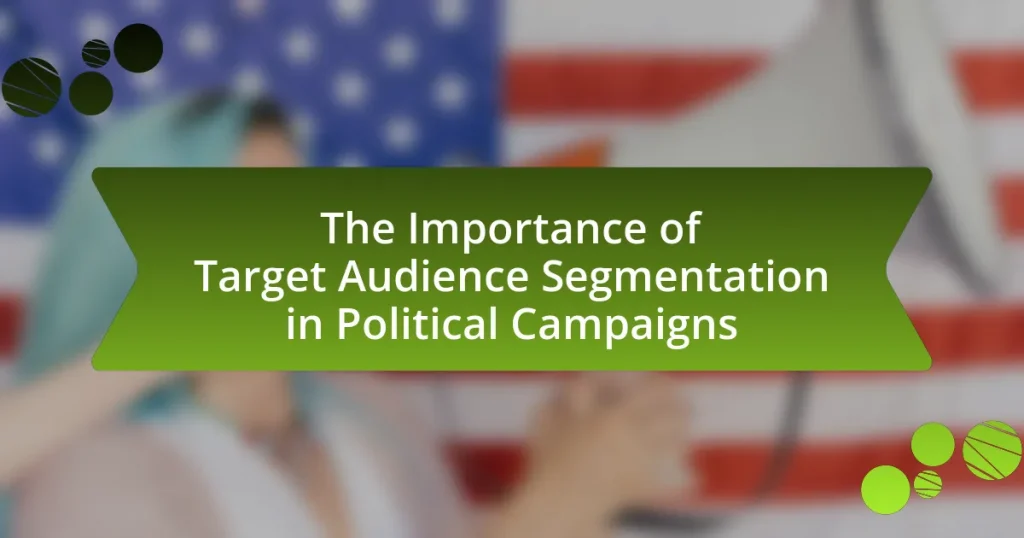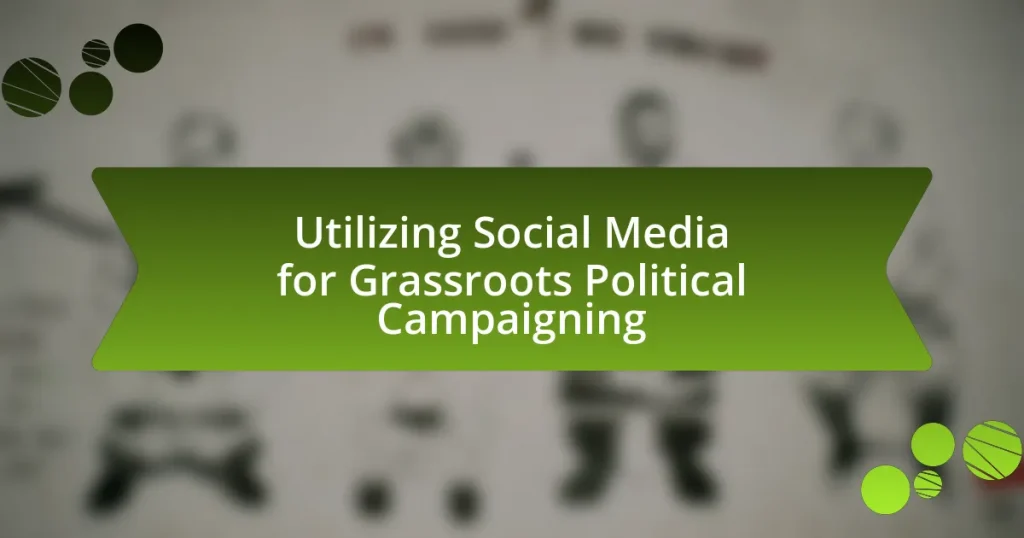Negative campaigning is a political strategy that focuses on attacking an opponent’s character, policies, or qualifications rather than promoting one’s own platform. This article explores the implications of negative campaigning on political discourse, voter psychology, and public perception of candidates. It examines the reasons candidates resort to such tactics, the strategic advantages they provide, and the influence of the competitive landscape. Additionally, the article outlines effective strategies for candidates to navigate negative campaigning, including maintaining a positive narrative and engaging with voters. Ethical considerations and the role of media in amplifying negative messages are also discussed, along with the long-term effects on political landscapes and voter behavior.
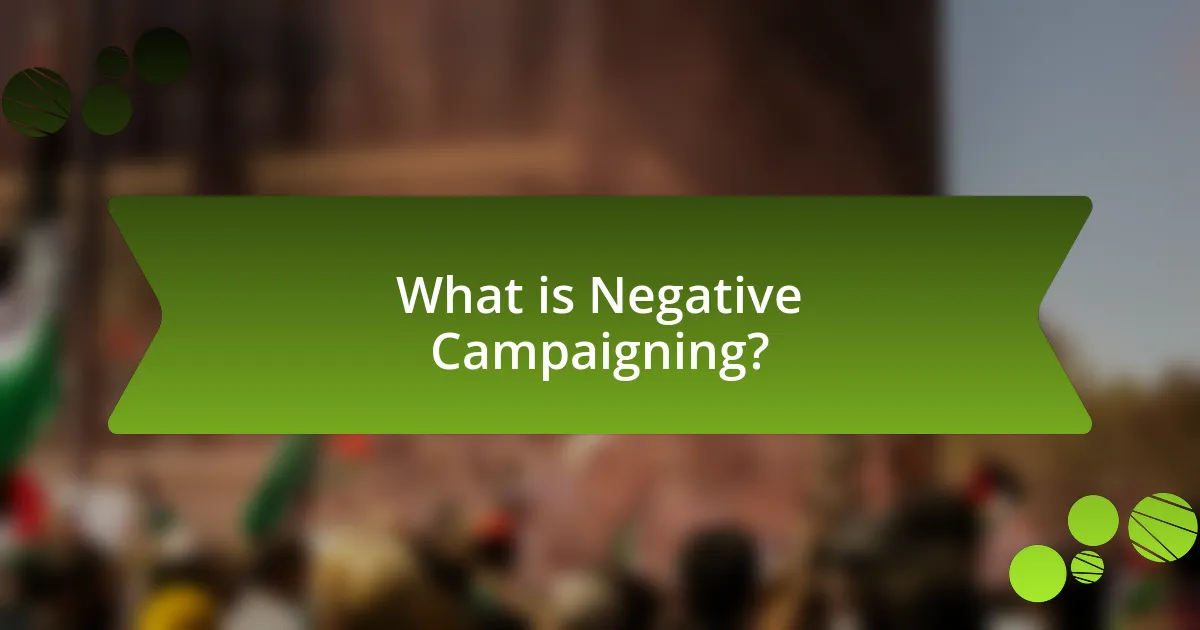
What is Negative Campaigning?
Negative campaigning is a political strategy that involves attacking an opponent’s character, policies, or qualifications rather than focusing on one’s own platform. This approach aims to create doubt or fear among voters regarding the opponent, often utilizing misleading information or emotional appeals. Research indicates that negative campaigning can be effective; for instance, a study published in the Journal of Politics found that negative ads can increase voter turnout by making elections feel more competitive.
How does Negative Campaigning impact political discourse?
Negative campaigning significantly polarizes political discourse by fostering division among voters. This tactic often emphasizes personal attacks and negative portrayals of opponents, which can lead to increased animosity and reduced willingness to engage in constructive dialogue. Research indicates that negative campaigning can decrease voter turnout, as individuals may feel disillusioned by the negativity and choose not to participate in the electoral process. For instance, a study published in the Journal of Politics found that exposure to negative ads can lead to a 5% decrease in voter turnout, demonstrating the tangible effects of such strategies on civic engagement.
What are the psychological effects of Negative Campaigning on voters?
Negative campaigning significantly impacts voters’ psychological states, often leading to increased anxiety and polarization. Research indicates that exposure to negative political advertisements can heighten feelings of distrust towards candidates and the political system, as evidenced by a study published in the Journal of Politics, which found that negative ads can decrease voter turnout by fostering cynicism. Additionally, negative campaigning can reinforce existing biases, causing voters to become more entrenched in their political beliefs, as shown in a study by the American Political Science Review, which highlighted that negative messaging can solidify partisan identities. These psychological effects contribute to a more divisive political landscape, ultimately influencing electoral outcomes.
How does Negative Campaigning shape public perception of candidates?
Negative campaigning significantly shapes public perception of candidates by influencing voter attitudes and opinions through targeted attacks on an opponent’s character, policies, or qualifications. Research indicates that negative ads can lead to increased voter awareness and engagement, but they often result in a more unfavorable view of the attacked candidate. For instance, a study by the American Political Science Review found that negative campaigning can decrease the favorability ratings of candidates by as much as 10% in the short term. This effect is particularly pronounced when voters perceive the attacks as credible and relevant, leading to a shift in support toward the candidate employing negative tactics.
Why do candidates resort to Negative Campaigning?
Candidates resort to negative campaigning primarily to undermine their opponents and enhance their own chances of winning. This strategy is often employed because it can effectively sway public opinion by highlighting an opponent’s weaknesses or controversial actions. Research indicates that negative ads can be more memorable and persuasive than positive ones, as they evoke stronger emotional responses. For instance, a study by the American Political Science Review found that negative campaigning can lead to increased voter turnout, as it engages and mobilizes voters who may feel strongly about the issues presented.
What strategic advantages does Negative Campaigning provide?
Negative campaigning provides strategic advantages such as increased voter attention and differentiation from opponents. By highlighting the weaknesses or failures of rivals, candidates can create a stark contrast that makes their own strengths more pronounced. Research indicates that negative ads tend to be more memorable, leading to higher recall rates among voters. For instance, a study by the American Political Science Review found that negative campaigning can lead to a 10-15% increase in voter turnout, as it often stirs emotional responses that engage the electorate more deeply. Additionally, negative campaigning can effectively frame the narrative, allowing candidates to control the conversation and set the agenda in their favor.
How does the competitive landscape influence the use of Negative Campaigning?
The competitive landscape significantly influences the use of negative campaigning by creating an environment where candidates feel pressured to differentiate themselves from their opponents. In highly competitive races, candidates often resort to negative tactics to undermine their rivals’ credibility and appeal to voters’ emotions. Research indicates that negative campaigning can be more effective in close contests, as it can sway undecided voters and reinforce existing biases against opponents. For instance, a study by Lau, Sigelman, and Rovner (2007) found that negative ads are more impactful in competitive elections, leading to a higher likelihood of voter engagement and turnout. Thus, the dynamics of competition drive candidates to adopt negative strategies as a means of gaining an electoral advantage.
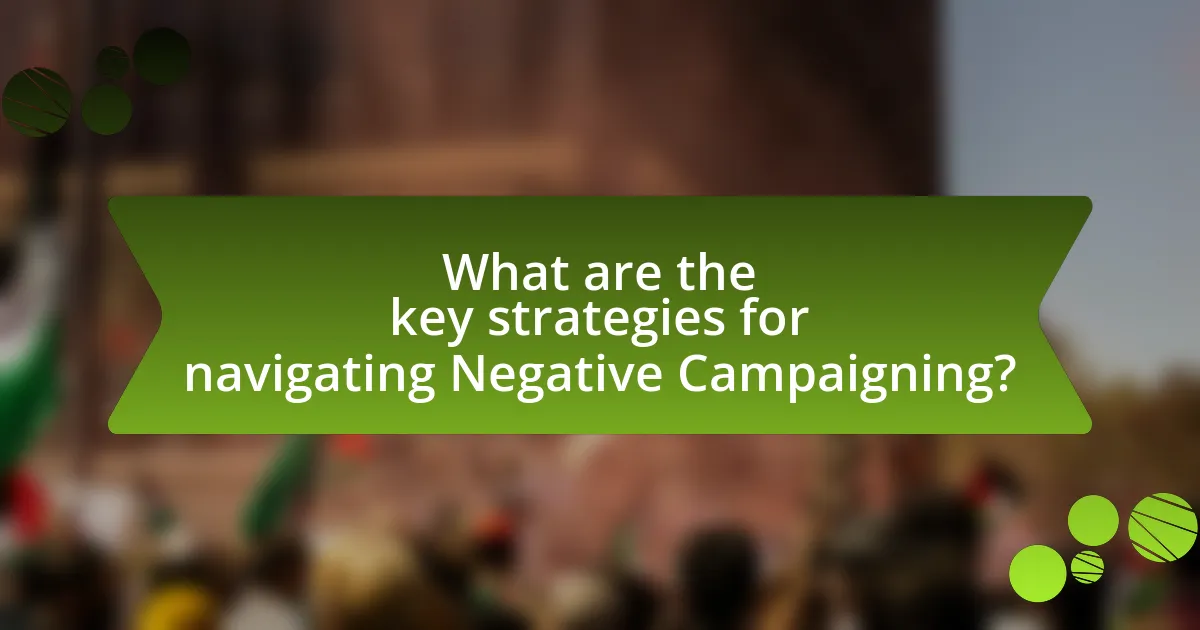
What are the key strategies for navigating Negative Campaigning?
Key strategies for navigating negative campaigning include maintaining a positive narrative, addressing attacks directly, and focusing on voter engagement. Maintaining a positive narrative involves consistently communicating a candidate’s vision and values, which can counteract negative messages. Addressing attacks directly means responding to misinformation or negative claims promptly and factually, thereby reducing their impact. Focusing on voter engagement emphasizes building relationships with constituents through outreach and dialogue, which can foster trust and loyalty despite negative campaigning tactics. These strategies are supported by research indicating that candidates who effectively manage negative campaigning can mitigate its effects and maintain voter support.
How can candidates effectively counter Negative Campaigning?
Candidates can effectively counter negative campaigning by maintaining a positive message, directly addressing false claims, and engaging with voters through transparent communication. By focusing on their own strengths and policy proposals, candidates can shift the narrative away from negativity. Research indicates that campaigns emphasizing positive messaging can lead to increased voter support; for instance, a study by the American Political Science Review found that candidates who highlight their achievements are more likely to resonate with undecided voters. Additionally, promptly refuting misinformation with factual evidence helps to mitigate the impact of negative attacks, as demonstrated in various electoral cycles where candidates who responded quickly to falsehoods maintained their credibility.
What messaging techniques can mitigate the impact of Negative Campaigning?
Messaging techniques that can mitigate the impact of negative campaigning include emphasizing positive narratives, utilizing fact-checking, and fostering emotional connections. Positive narratives focus on the candidate’s strengths and achievements, which can counteract negative portrayals. For instance, campaigns that highlight community service or policy successes can shift the narrative away from attacks. Fact-checking serves to debunk false claims made in negative ads, reinforcing the credibility of the candidate and providing voters with accurate information. Additionally, fostering emotional connections through storytelling can create a bond with voters, making them less susceptible to negative messages. Research indicates that campaigns employing these techniques can improve voter perception and engagement, ultimately reducing the effectiveness of negative campaigning.
How can candidates maintain their integrity while responding to Negative Campaigning?
Candidates can maintain their integrity while responding to negative campaigning by focusing on factual rebuttals and emphasizing their core values. By addressing false claims directly with evidence, candidates can demonstrate transparency and honesty, which reinforces their credibility. For instance, a study by the Pew Research Center found that voters appreciate candidates who respond to attacks with clear, fact-based information rather than engaging in personal attacks. This approach not only counters misinformation but also aligns with ethical campaigning practices, fostering trust among constituents.
What role does media play in Negative Campaigning?
Media plays a crucial role in negative campaigning by amplifying negative messages and shaping public perception. Through various platforms, such as television, social media, and print, media disseminates attack ads and negative narratives that can significantly influence voter opinions. For instance, studies have shown that negative political advertisements are more memorable and persuasive than positive ones, leading to increased voter engagement and shifts in support. According to research published in the Journal of Politics, negative campaigning can lead to a 10-20% increase in voter turnout, as individuals become more motivated to express their opinions in response to negative portrayals of candidates. Thus, the media serves as a powerful conduit for negative campaigning, affecting electoral outcomes and public discourse.
How can candidates leverage media to counteract Negative Campaigning?
Candidates can leverage media to counteract negative campaigning by actively promoting positive narratives and engaging directly with voters through various platforms. By utilizing social media, candidates can share their accomplishments, values, and vision, effectively countering misinformation and negative portrayals. For instance, during the 2020 U.S. presidential election, candidates who maintained a strong online presence and communicated transparently were able to mitigate the impact of negative ads and narratives. Research indicates that positive messaging can significantly influence voter perception, as seen in studies showing that campaigns with a focus on constructive dialogue tend to resonate better with the electorate.
What are the risks of engaging with media during Negative Campaigning?
Engaging with media during negative campaigning poses several risks, including potential backlash from the public, misinterpretation of messages, and the amplification of negative narratives. Public backlash can occur as audiences may perceive negative campaigning as unethical, leading to decreased support for the candidate involved. Misinterpretation of messages can arise when media outlets or audiences misconstrue the intent behind negative ads or statements, resulting in unintended consequences. Additionally, negative narratives can be amplified through social media, where misinformation can spread rapidly, further damaging a candidate’s reputation. Research indicates that negative campaigning can lead to voter apathy, as seen in studies by the American Political Science Review, which highlight how negative ads can discourage voter turnout.
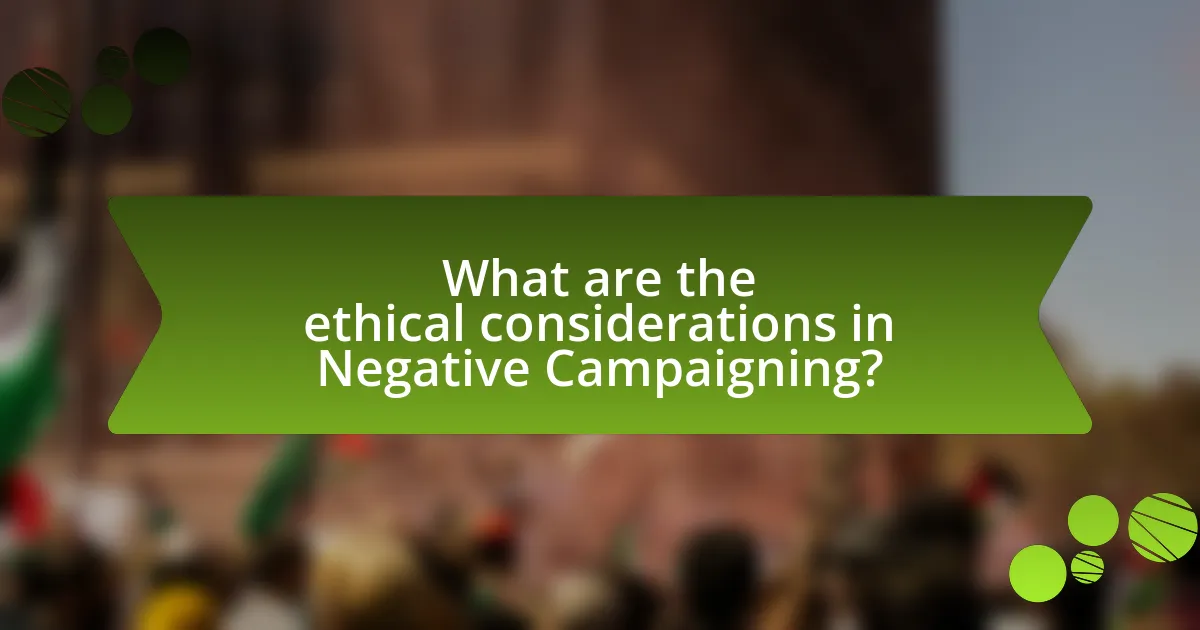
What are the ethical considerations in Negative Campaigning?
Negative campaigning raises significant ethical considerations, primarily concerning honesty, integrity, and the potential for harm. Ethical concerns include the dissemination of false information, which can mislead voters and undermine democratic processes. For instance, studies have shown that negative ads can distort public perception, leading to increased polarization and voter apathy. Additionally, negative campaigning often targets personal attributes rather than policy positions, which can contribute to a toxic political environment. The American Psychological Association highlights that such tactics can erode trust in political institutions and diminish civic engagement. Therefore, the ethical implications of negative campaigning necessitate a careful balance between competitive strategy and the responsibility to maintain a fair and informed electoral process.
How can candidates ensure ethical practices while campaigning negatively?
Candidates can ensure ethical practices while campaigning negatively by adhering to factual accuracy and transparency in their messaging. This involves verifying claims about opponents and avoiding misleading statements, as seen in the 2004 U.S. presidential election where candidates faced scrutiny for false accusations. Additionally, candidates should focus on policy differences rather than personal attacks, which can foster a more respectful discourse. Research indicates that campaigns emphasizing issues rather than character can lead to higher voter trust and engagement. By maintaining these standards, candidates can navigate negative campaigning ethically while still addressing their opponents’ shortcomings.
What guidelines should candidates follow to avoid crossing ethical lines?
Candidates should adhere to transparency, honesty, and respect for opponents to avoid crossing ethical lines. Transparency involves clearly disclosing campaign funding sources and affiliations, which fosters trust and accountability. Honesty requires candidates to present factual information about themselves and their opponents, avoiding misleading statements or exaggerations. Respect for opponents entails refraining from personal attacks and focusing on policy differences, which maintains a civil discourse and upholds the integrity of the electoral process. These guidelines are supported by the American Association of Political Consultants, which emphasizes ethical standards in political campaigning.
How does public opinion shape the ethics of Negative Campaigning?
Public opinion significantly influences the ethics of negative campaigning by establishing societal norms and expectations regarding acceptable behavior in political discourse. When voters express disapproval of aggressive or misleading tactics, candidates may adjust their strategies to align with public sentiment, prioritizing ethical considerations to maintain their support. For instance, research by the Pew Research Center indicates that 70% of voters believe negative campaigning is harmful to democracy, prompting candidates to reconsider their approach to avoid backlash and potential loss of credibility. This dynamic illustrates how public opinion serves as a regulatory force, shaping the ethical boundaries within which negative campaigning operates.
What are the long-term effects of Negative Campaigning on political landscapes?
Negative campaigning has significant long-term effects on political landscapes, primarily leading to increased voter cynicism and polarization. Research indicates that negative ads can diminish trust in political institutions, as evidenced by a study from the American Political Science Review, which found that exposure to negative campaigning correlates with lower levels of political engagement and higher levels of disillusionment among voters. Additionally, negative campaigning often entrenches partisan divides, making bipartisan cooperation more challenging, as shown in data from the Pew Research Center, which highlights that negative perceptions of opposing parties have intensified over the last two decades. These effects contribute to a more hostile political environment, where compromise becomes increasingly rare.
How does Negative Campaigning influence future elections?
Negative campaigning significantly influences future elections by shaping voter perceptions and altering candidate strategies. Research indicates that negative ads can increase voter turnout by mobilizing those who feel strongly about the issues presented, as evidenced by a study from the American Political Science Review, which found that negative campaigning can lead to a 5-10% increase in voter participation. Additionally, candidates may adopt more aggressive tactics in subsequent elections, as they perceive the effectiveness of negative messaging in swaying undecided voters. This cycle can create a political environment where negativity becomes the norm, impacting the overall tone and content of electoral campaigns.
What changes in voter behavior can result from Negative Campaigning?
Negative campaigning can lead to increased voter apathy and polarization. Research indicates that exposure to negative advertisements often results in voters feeling disillusioned with the political process, which can decrease overall voter turnout. For instance, a study by the Pew Research Center found that negative campaigning can contribute to a significant drop in enthusiasm among voters, particularly among those who are already disengaged. Additionally, negative campaigning tends to reinforce existing biases, causing voters to become more entrenched in their political affiliations, which can lead to greater polarization within the electorate. This behavior shift is evidenced by the 2016 U.S. presidential election, where negative ads were prevalent and correlated with heightened partisan divides among voters.
What practical tips can candidates use to succeed in Negative Campaigning?
Candidates can succeed in negative campaigning by focusing on clear messaging, targeting specific issues, and maintaining a consistent narrative. Clear messaging ensures that the audience understands the candidate’s stance and the reasons behind the negative portrayal of opponents. Targeting specific issues allows candidates to highlight weaknesses in their opponents’ policies or character, making the campaign more impactful. Maintaining a consistent narrative helps reinforce the message and keeps the campaign focused, which is crucial for voter retention and engagement. Research indicates that campaigns that effectively communicate their negative messages can influence voter perceptions and behavior, as seen in various electoral studies.
How can candidates develop a robust response strategy?
Candidates can develop a robust response strategy by conducting thorough research on potential negative attacks and preparing clear, fact-based counterarguments. This involves analyzing past campaigns to identify common tactics used against candidates, which allows for proactive planning. For instance, a study by the Pew Research Center indicates that candidates who anticipate and prepare for negative campaigning can mitigate its impact by addressing issues directly and transparently. By crafting concise messages that reinforce their strengths and clarify misinformation, candidates can effectively respond to attacks and maintain voter trust.
What best practices should candidates adopt to navigate Negative Campaigning effectively?
Candidates should adopt a proactive communication strategy to navigate negative campaigning effectively. This involves addressing negative claims directly and transparently, rather than ignoring or deflecting them. Research indicates that candidates who respond to negative campaigning with clear, factual rebuttals can mitigate the impact of such attacks. For instance, a study by the American Political Science Review found that candidates who engage in counter-messaging can maintain voter support despite negative ads. Additionally, candidates should focus on reinforcing their positive message and core values, as this can help to overshadow negative narratives. Engaging with voters through town halls and social media can also foster a sense of connection and trust, which is crucial during negative campaigning.


